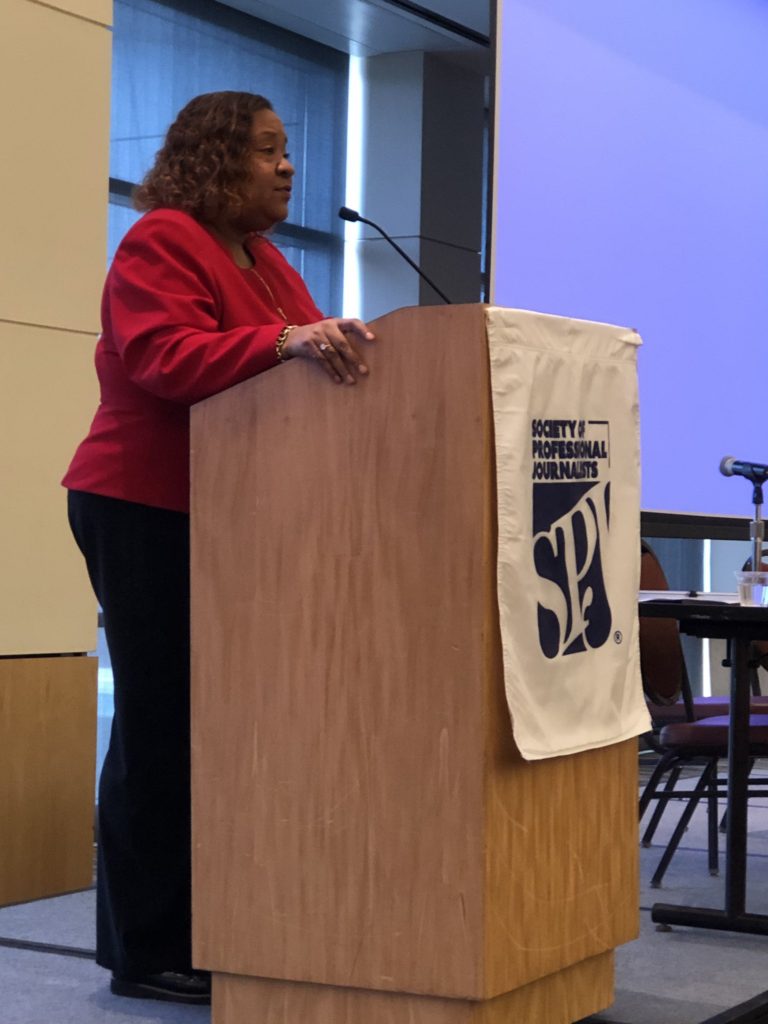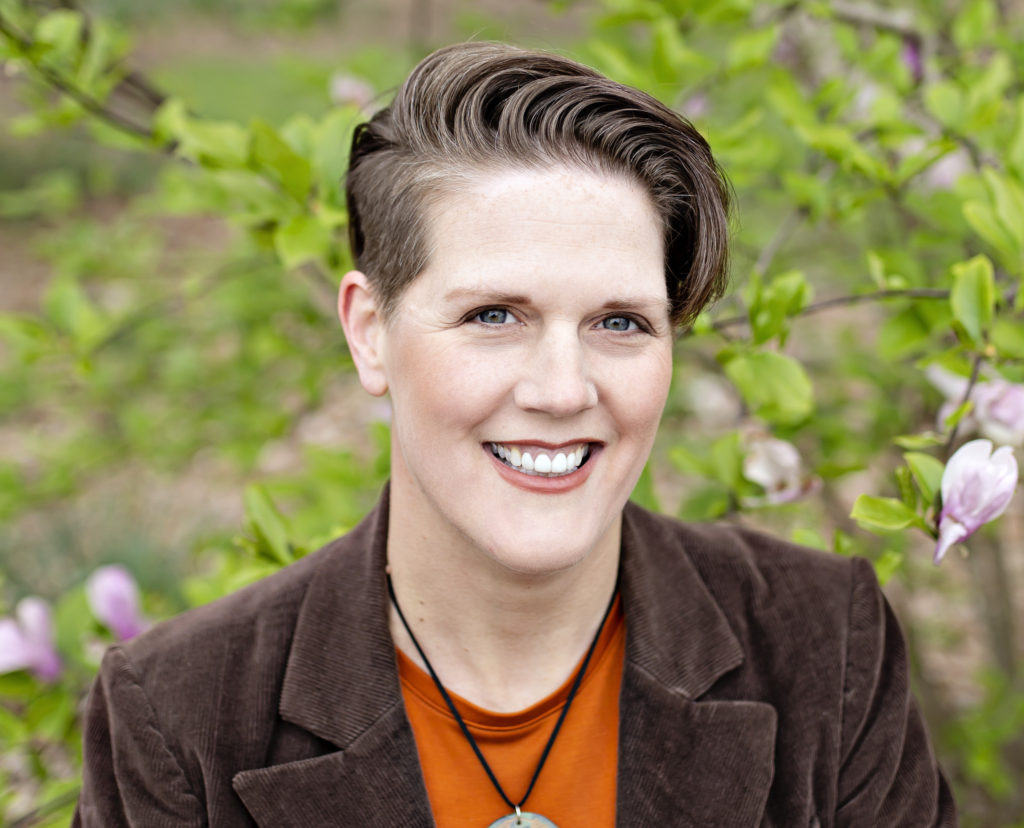By Bonnie Jean Feldkamp
NSNC Communications Director

Nikole Hannah-Jones of The New York Times won the 2020 Pulitzer Prize for Commentary with her essay from the newspaper’s 1619 project “Our democracy’s founding ideals were false when they were written. Black Americans have fought to make them true.” This extraordinary essay not only stands out for its Pulitzer Prize quality but also for its unprecedented length. A single essay of more than 7,000 words has never won the Pulitzer Prize in the Commentary category. Traditionally, a columnist has won that category with a series of columns.
The rules state the prize is given “For distinguished commentary, using any available journalistic tool, Fifteen thousand dollars ($15,000)… And up to 10 items make up an entry.” You can view the full history of winners on the Pulitzer website HERE. This prompted me to reach out to Pulitzer Prize Administrator Dana Canedy.
Below is the transcript of our May 27 phone conversation. Canedy was confident and to the point in her responses but her tone was gracious and kind. Her enthusiasm for the Pulitzers and its process rings true. I am grateful she took the time to talk to me.
Bonnie Jean Feldkamp: All the buzz in the columnists’ world is how different of a selection this year was than what traditionally wins…
Dana Canedy: It’s actually really not different at all.
Feldkamp: No? Okay, talk to me then.
Canedy: It’s commentary. Very powerful commentary, which is exactly what we look for every year. So, in that sense it’s not different. It’s extraordinary work. Commentary is supposed to be thoughtful, provocative, and insightful and interesting. It’s supposed to make folks think of things in ways they haven’t and this accomplished all of that.
Feldkamp: The worry of some columnists in this very worrisome industry right now is that smaller newspapers aren’t going to have the resources to dedicate to a large project like that and is that going to be the expectation going forward?
Canedy: First of all, one year doesn’t make a trend and second of all look at the small winners that did win this year. Our winner in Public Service, which is our most prestigious category. So, I don’t think you can draw those kinds of conclusions from this at all. Every year is different. The board looks at all the contenders equally and gives them equal weight and the best work rises to the top every year. That’s not going to change. Again, I would just look to the Breaking News win this year which went to the Louisville Courier-Journal; the Public Service Pulitzer went to a very small newspaper (Anchorage Daily News with contributions from ProPublica).
Feldkamp: Did you receive a lot of “out-of-the-box” entries? Is this the first time you’ve seen someone throw 8,000 words into the hopper instead of a lineup of ten columns?
Canedy: I have to tell you this is not out of the box.
Feldkamp: No?
Canedy: No. It really isn’t. We receive hundreds of applications in every category and they’re all different. For us, this is not unusual.
Feldkamp: That’s good to know. You can see how you learn from this kind of win. Maybe there are a lot of columnists shaking in their boots because we’re getting fired and this sets the bar at a completely different level – we’re not even getting paid to write at that kind of word count.
Canedy: Look at the other finalists in this category that were contenders. I think this was just an extraordinary piece of commentary this year and we’ll see what happens next year.
Feldkamp: So, this is not the death knell for the newspaper columnist, state of our industry?
Canedy: I’m actually really surprised to hear that.
Feldkamp: I’m glad to hear you say that because the industry is shrinking and changing so fast.
Canedy: Look at the winners over the last couple of years if you want to look at a trend you’ll see that honored columnists of news organizations of all sizes and that’s not going to change. We have no interest in that changing.
Feldkamp: Do you think you’ll get more newspapers that will submit longer-form entries?
Canedy: I really don’t. We get hundreds of applications in this category every year and we always get long-form work as well as traditional columns. So, again for us this is really not unusual.
Feldkamp: This is just the first time one has taken the prize.
Canedy: I don’t even know if it’s the first time. Every year is unique and there are things that happen that are unique across categories every single year. In the music category the year Kendrick Lamar won (2018) obviously the classically trained composers worried that this was going to be the death of the music category. So, whenever we do something that in some regard is different, people worry about that but we weren’t sending a signal at all we were just picking the best work in that category this year.
Feldkamp: And the category was as robust as ever.
Canedy: Yes, absolutely.
Feldkamp: Is the genre changing? Are literary magazines that publish more of the 10,000-word essays now going to be submitting more to this category? Could you see a word-count cap ever happening?
Canedy: We don’t judge by word count and even if we saw that trend it doesn’t mean they’d win. What we look for hasn’t changed fundamentally. And length doesn’t win you a Pulitzer Prize. It’s the actual content.
Feldkamp: Anything you’d like to add that I didn’t address?
Canedy: No, I think you covered it. Thank you for taking the time and for having an interest in the Pulitzer Prizes.
Bonnie Jean Feldkamp is an award-winning freelance writer and op-ed contributor. She is the Communications Director for the NSNC, a member of the Cincinnati Enquirer Editorial Board, and a board member for the Cincinnati Chapter of the SPJ. She lives with her family in Northern Kentucky. Find her on social media @WriterBonnie or at WriterBonnie.com.


